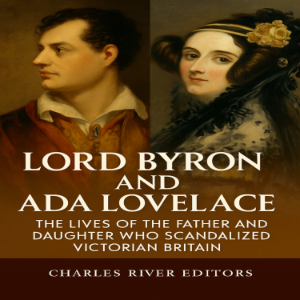

Lord Byron and Ada Lovelace: The Lives of the Father and Daughter Who Scandalized Victorian Britain
Charles River Editors
Lord Byron’s very name conjures up visions of the Romantic movement and outlandishly dressed bohemians, for if Alfred, Lord Tennyson was the poetic darling of the masses, Byron was the hero of the hedonists. While the traditional English literary hero was a nobleman rescuing a damsel in distress, Byron created the anti-hero, a man plagued by self-doubt and hidden sorrow. At the same time, his hero was also capable of facing reality once he had wrestled through his own angst, and even of occasionally acting nobly in the great tradition of the author’s Puritan forebears.
If Byron himself was eclectic in his tastes and character, his poetry was even more so, for he could feature satiric pieces poking fun at the status quo and historical renditions of ancient battles fought with nobility and valor, all in the same volume. Like so many other writers, he used poetry to explore his own most deeply guarded secrets, in one poem playing in first person the dramatic hero and in another the troubled penitent. He was sometimes funny, sometimes lyrical, and sometimes verbose, but he was always interesting, and that is what allowed him to become one of the most famous writers of all time, almost against his own will, and despite his premature death.
Charles Babbage and Ada Lovelace were the first to conceive the notion of a programmable and automatic universal computer, which, on top of its ability to calculate any mathematical equation at an unmatched speed, could also be used for a seemingly infinite number of other applications. In other words, they envisioned the precursor to the modern computer. It was certainly an unusual path for any woman, and she managed to do so before an incredibly premature death. Augusta Ada King, Countess of Lovelace, died in 1852 at the age of 36, but during her short and tumultuous life, she was one of the first to recognize that computers could do far more than complex calculations.
Duration - 2h 14m.
Author - Charles River Editors.
Narrator - Victoria Woodson.
Published Date - Thursday, 16 January 2025.
Copyright - © 2025 Charles River Editors ©.
Location:
United States
Description:
Lord Byron’s very name conjures up visions of the Romantic movement and outlandishly dressed bohemians, for if Alfred, Lord Tennyson was the poetic darling of the masses, Byron was the hero of the hedonists. While the traditional English literary hero was a nobleman rescuing a damsel in distress, Byron created the anti-hero, a man plagued by self-doubt and hidden sorrow. At the same time, his hero was also capable of facing reality once he had wrestled through his own angst, and even of occasionally acting nobly in the great tradition of the author’s Puritan forebears. If Byron himself was eclectic in his tastes and character, his poetry was even more so, for he could feature satiric pieces poking fun at the status quo and historical renditions of ancient battles fought with nobility and valor, all in the same volume. Like so many other writers, he used poetry to explore his own most deeply guarded secrets, in one poem playing in first person the dramatic hero and in another the troubled penitent. He was sometimes funny, sometimes lyrical, and sometimes verbose, but he was always interesting, and that is what allowed him to become one of the most famous writers of all time, almost against his own will, and despite his premature death. Charles Babbage and Ada Lovelace were the first to conceive the notion of a programmable and automatic universal computer, which, on top of its ability to calculate any mathematical equation at an unmatched speed, could also be used for a seemingly infinite number of other applications. In other words, they envisioned the precursor to the modern computer. It was certainly an unusual path for any woman, and she managed to do so before an incredibly premature death. Augusta Ada King, Countess of Lovelace, died in 1852 at the age of 36, but during her short and tumultuous life, she was one of the first to recognize that computers could do far more than complex calculations. Duration - 2h 14m. Author - Charles River Editors. Narrator - Victoria Woodson. Published Date - Thursday, 16 January 2025. Copyright - © 2025 Charles River Editors ©.
Language:
English
Opening Credits
Duration:00:00:10
Introduction
Duration:00:06:20
Byron's Childhood
Duration:00:08:01
A Budding Writer
Duration:00:12:30
The Grand Tour
Duration:00:11:05
A Rendezvous with Destiny
Duration:00:26:14
A Budding Talent
Duration:00:33:48
The Countess of Lovelace
Duration:00:06:35
The Enchantress of Number
Duration:00:23:08
Rediscovering Ada Lovelace
Duration:00:06:52
Ending Credits
Duration:00:00:11